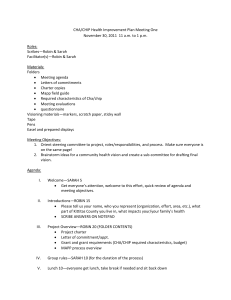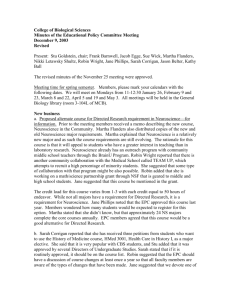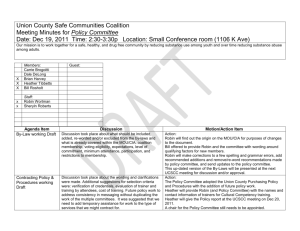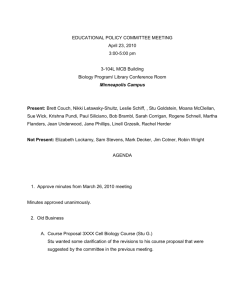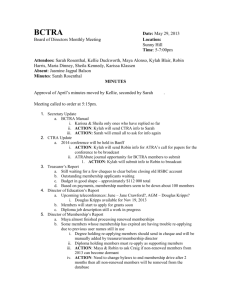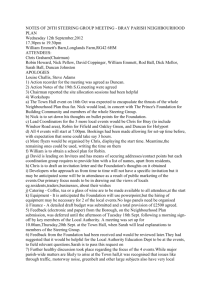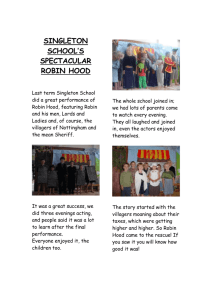11-11-03 - College of Biological Sciences
advertisement
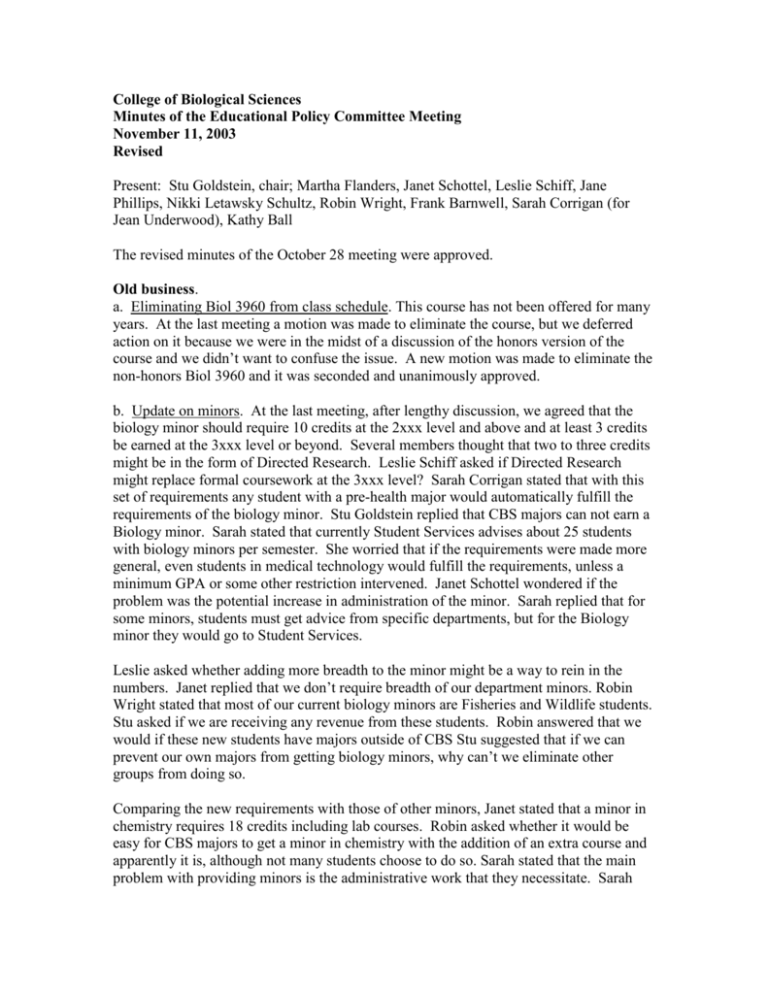
College of Biological Sciences Minutes of the Educational Policy Committee Meeting November 11, 2003 Revised Present: Stu Goldstein, chair; Martha Flanders, Janet Schottel, Leslie Schiff, Jane Phillips, Nikki Letawsky Schultz, Robin Wright, Frank Barnwell, Sarah Corrigan (for Jean Underwood), Kathy Ball The revised minutes of the October 28 meeting were approved. Old business. a. Eliminating Biol 3960 from class schedule. This course has not been offered for many years. At the last meeting a motion was made to eliminate the course, but we deferred action on it because we were in the midst of a discussion of the honors version of the course and we didn’t want to confuse the issue. A new motion was made to eliminate the non-honors Biol 3960 and it was seconded and unanimously approved. b. Update on minors. At the last meeting, after lengthy discussion, we agreed that the biology minor should require 10 credits at the 2xxx level and above and at least 3 credits be earned at the 3xxx level or beyond. Several members thought that two to three credits might be in the form of Directed Research. Leslie Schiff asked if Directed Research might replace formal coursework at the 3xxx level? Sarah Corrigan stated that with this set of requirements any student with a pre-health major would automatically fulfill the requirements of the biology minor. Stu Goldstein replied that CBS majors can not earn a Biology minor. Sarah stated that currently Student Services advises about 25 students with biology minors per semester. She worried that if the requirements were made more general, even students in medical technology would fulfill the requirements, unless a minimum GPA or some other restriction intervened. Janet Schottel wondered if the problem was the potential increase in administration of the minor. Sarah replied that for some minors, students must get advice from specific departments, but for the Biology minor they would go to Student Services. Leslie asked whether adding more breadth to the minor might be a way to rein in the numbers. Janet replied that we don’t require breadth of our department minors. Robin Wright stated that most of our current biology minors are Fisheries and Wildlife students. Stu asked if we are receiving any revenue from these students. Robin answered that we would if these new students have majors outside of CBS Stu suggested that if we can prevent our own majors from getting biology minors, why can’t we eliminate other groups from doing so. Comparing the new requirements with those of other minors, Janet stated that a minor in chemistry requires 18 credits including lab courses. Robin asked whether it would be easy for CBS majors to get a minor in chemistry with the addition of an extra course and apparently it is, although not many students choose to do so. Sarah stated that the main problem with providing minors is the administrative work that they necessitate. Sarah added that it involves paper work, processing, a one half hour appointment per student, graduation clearance and notifying the student’s home college. Robin asked why students don’t do the notification, and Sarah replied that many students don’t follow through. Robin suggested that one way to streamline the process would be to hold two group meetings per semester rather than individual meetings. Janet suggested that if all the necessary information is on the APAS it shouldn’t be a problem. Robin answered that the APAS is often inaccurate. Several members suggested that if students could handle this on the web, it would save advisor time. Sarah asked how to determine when such a minor requires too much administrative work. Robin suggested that if it is a matter of checking APAS reports we could get funds to cover that. Stu agreed that such duties should not take up an advisor’s time. Jane warned the group that if we go back to hand checking everything we will be no further than we were 25 years ago before computers. Sarah stated that one problem with the minor is that we need to set a reasonable deadline so that the paperwork can be processed. Janet suggested that the minor must be declared prior to the time that the student applies for the degree and to permit no exceptions. Jane suggested that Jim Smith could develop an appropriate form for the website. Frank Barnwell asked if it is a good thing if CBS produces lots of minors. Robin answered that it is positive if the minor attracts students who wouldn’t normally take their electives here. Janet suggested that the number of credits for the minor be increased beyond ten. Leslie stated that she thinks one requirement should include a lecture-based course at the 3xxx level or beyond. Janet suggested requiring 15 credits with at least one upper division course that is not Directed Research. Stu warned against discouraging students from taking 2xxx courses. Sarah wondered if there should be a list of courses that would be appropriate, but Stu replied that there are too many options to make that a workable idea. Robin suggested that since biology implies breadth, perhaps require one plant or microbiology course. She added that premed students would already have taken animal oriented courses and this might expose them to something else. Jane said that this might be true for premed majors, but plant science majors could equally be deficient in animal-based courses. Several members liked the idea of plant or micro courses being part of the requirement. After further discussion, the committee agreed to have the following requirements for the biology minor. It will require at least 12 credits with CBS designators (with a short list of exceptions) and three of these credits must be at the 3xxx level or above in addition to the prerequisites of general chemistry and Biol 1001 or 1009. All courses must be completed with a grade of at least C-. The minor must be declared and acknowledged by the time the student applies for his/her degree. This degree will be available fall semester 2004. A motion was made to approve the biology minor, it was seconded and approved unanimously. Stu suggested that we revisit the minor in a few years to see if it needs any fine-tuning. Support will also be sought for additional secretarial staff. Jane stated that she knows a couple ex-employees who would love the chance to be involved in CBS. Perhaps they would be interested in helping out in Student Services if that would be appropriate. New business a. New course proposal, EEB 5xxx, Plant communities in space and time. Frank introduced this course and stated that Shinya Sugita would like to accommodate both advanced undergraduates and grad students. In order to receive graduate credit, students would have to write a paper. Leslie suggested that if Shinya expects different things from the two groups of students, the course should be listed at both the 3xxx and 5xxx levels or at the 3xxx and 4xxx. Frank explained that Shinya wants to include a critical thinking component and will expect the grad students to do more. Leslie asked what the balance of students might be and Frank guessed 80% grad students and 20% undergrad. Frank stated that it will probably be taught alternate years with EEB 5009 (Quaternary Vegetation History and Climate). Members wondered how this course will be different from other EEB courses such as Ecology of Vegetation, Ecological Biogeography and Quaternary Vegetation History and Climate. Frank replied that this course will emphasize modeling among other things. Robin suggested that the title reflect better what the course will cover. Frank stated that he will take our suggestions back to Shinya and we can continue the discussion at our next meeting. Announcements 1. Robin stated that CBS will become more proactive about admitting freshmen. She stated that we should be concerned about welcoming top students. Research shows that it is much easier to attract potential students if they actually come onto campus. 2. Robin added that we are ahead on the number of applications for this time of the cycle. Last year to date we had received 544 applications compared to 730 for this year. Of this number 115 have been admitted and nine students have confirmed that they will attend. Our aim is to admit 350 students. She will have more information about calling campaigns in the near future. 3. Robin stated that the Curriculum Task Force is meeting on a regular basis and is currently editing the learning objectives for the BS degree. After the committee has one more discussion of these objectives, the faculty will have a chance to discuss them. 4. Leslie reported that she is available to talk to faculty about developing writing intensive upper division courses. She stated that if these courses are developed correctly they are not that onerous. She added that CBS should provide more such courses at the 3xxx level or higher. 5. Since delivery of mail in some departments is rather irregular, members are asked to download electronic copies of EPC materials beginning with the next meeting. The meeting adjourned at 11:15 a.m. Submitted by Kathy Ball
